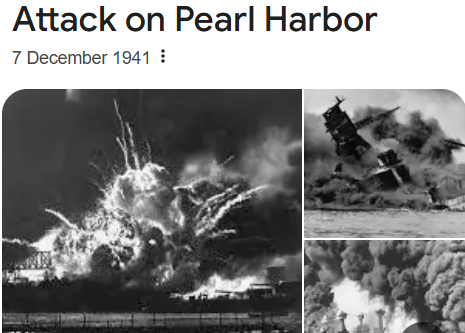December 7, 1941, marked one of the most pivotal moments in American history—the attack on Pearl Harbor. On this day, the Japanese military launched a surprise assault on the U.S. naval base in Hawaii, leading to the deaths of over 2,400 Americans and the destruction of numerous ships and aircraft. The event thrust the United States into World War II, with President Franklin D. Roosevelt famously declaring it “a date which will live in infamy.”

This date is trending on USA social media today as Americans commemorate the 83rd anniversary of the tragedy. Conversations revolve around honoring the sacrifices of those who served and reflecting on the lessons of unity and resilience during a time of national crisis. The resurgence of interest often aligns with educational posts, historical documentaries, and tributes shared by veterans’ organizations and history enthusiasts.
Why did Japan bomb Pearl Harbor?
However, striking south into British Malaya and the Dutch East Indies would almost certainly provoke an armed U.S response. To blunt that response, Japan decided to attack the U.S Pacific Fleet at Pearl Harbor, hoping that the U.S would negotiate peace.
How many Japanese planes were shot down Pearl Harbor?
At about 0945 on the morning of 7 December 1941, their assigned missions successfully completed, the last Japanese planes left the area to return to their carriers. Total Japanese aircraft losses were light, only 29 planes, nine of them in the first wave.
What did America do after Pearl Harbor attack?
After the Japanese bombing of Pearl Harbor in December, 1941, the United States declared war on Japan. Germany and Italy declared war on the U.S. a few days later, and the nation became fully engaged in the Second World War. U.S. involvement in the Second World War was quickly followed by a massive mobilization effort.
What was the revenge of Pearl Harbor?
Lt. Col. Jimmy Doolittle of the Army Air Force led a group of 16 B-25 bombers on a raid over Tokyo as retaliation for Pearl Harbor and a reminder that American bombers could still reach the Japanese homeland.
Why did the US drop an atomic bomb on Hiroshima and Nagasaki?
The United States dropped atomic bombs on the Japanese cities of Hiroshima and Nagasaki in August 1945 during World War II, primarily to bring the war to a swift end and to avoid what was anticipated to be a costly and bloody invasion of Japan. The decision was influenced by a combination of military, political, and strategic factors:

1. End the War Quickly
- Japan’s resistance: Despite suffering significant defeats, Japan showed no signs of surrender. The U.S. military feared that Japan’s strong resistance would prolong the war, causing even greater loss of life.
- Casualty concerns: Estimates for a conventional invasion of Japan projected hundreds of thousands of casualties on both sides, making the atomic bomb a seemingly effective way to compel Japan to surrender quickly.
2. Demonstrate Power
- Global politics: The use of the bomb was also a signal to the Soviet Union, showcasing the United States’ technological and military superiority at the dawn of the Cold War era.
- Testing new technology: While the Manhattan Project was a massive undertaking to develop nuclear weapons, there was also a desire to test the bomb’s effectiveness in a real-world scenario.
3. Japan’s Surrender
- Military and civilian targets: Hiroshima (August 6) and Nagasaki (August 9) were chosen as targets due to their military importance and their relative lack of prior bombing damage, which allowed for clear assessment of the bomb’s effects.
- Impact of the bombings: The unprecedented destruction and loss of life prompted Japan’s surrender on August 15, 1945, leading to the official end of World War II on September 2, 1945.
4. Moral and Ethical Considerations
- The decision remains controversial, as it resulted in immense civilian casualties and long-term suffering from radiation exposure. Critics argue that Japan might have surrendered through other means, while supporters contend that the bombings ultimately saved more lives by averting a prolonged war.
In summary, the bombings were primarily motivated by the desire to end the war swiftly, minimize Allied casualties, and assert U.S. dominance in the post-war world. However, the decision has sparked ongoing debates about the morality and necessity of using atomic weapons.
